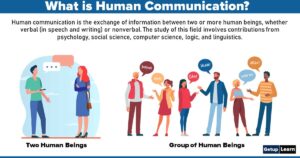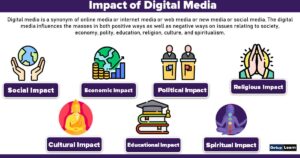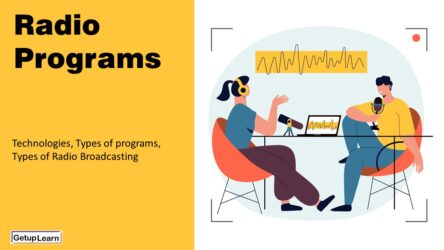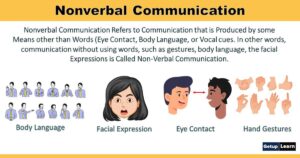Mass media doesn’t exist for a single purpose. With its evolution, more and more uses have developed and the role it plays in our lives has increased greatly. Wright characterizes seven functions of mass media that offer insight into its role in our lives.
Table of Contents
Table of Contents
Functions of Mass Media
Mass media have a responsible role to play in fostering democracy, plurality, and communal harmony through the functions listed below:
- Information and Education
- Socialization
- Entertainment
- Political Awareness
- Cultural Transmission
- Catalyst to Development
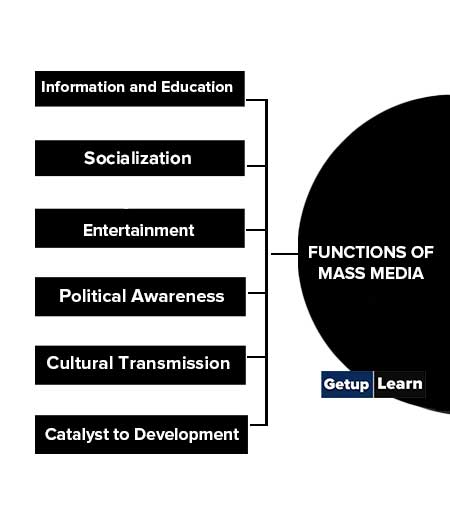
Information and Education
Mass media carry a lot of information which are essential for our day-to-day life. We get examination results, weather forecasts, current affairs, traffic regulations, alerts, precautions, government policies, etc. from mass media.
The core of the media’s information function is performed by the media content called news. Good media try to carry accurate, objective, and complete information since biased or incomplete reports will keep the audience away from the media.
Education is systematically organized information with predefined objectives. Schools and colleges are the primary sources of formal education in our society. After finishing their formal education, members of society depend on mass media for life-long education.
They provide society with updated educational content on a wide variety of subjects at the lowest cost. News-based contents like reports, features, photos, cartoons, and editorials and nonnews content like advertisements educate people about the newest trends in their surroundings.
Mass media assist the formal education system also, by publicizing information on educational programs, publishing special educational supplements, and inspiring society to acquire higher education. Educational supplements published by various Malayalam newspapers, educational television, and radio channels are examples of educational services of mass media.
Mass media function as an agency for socialization. Socialization means empowering people to acquire norms and experiences of the group as a whole, to maintain cultural consensus and communal harmony. It is through mass media that we know the cultural and social norms of various groups in our society.
On the basis of this information, individuals honor others and behave according to common values and thus creating an integrated society.
Entertainment
We all need entertainment to break the monotony of our hectic, stressful life and divert our attention from the troubles and tensions. All media have entertainment content. Newspapers publish cartoons, comics, puzzles, and special weekend supplements.
The lion’s share of magazine content such as short stories, novels, satires, and comics is also intended to entertain the audience. Movies are another big stock for entertainment. Broadcast media such as television and radio primarily concentrate on entertainment functions through their programs based on sports, film, serials, music, dance, comedy, animation, and fashion shows.
Nowadays, entertainment has become a big industry comprising motion picture companies, music firms, theatre groups, and game developers.
Political Awareness
If you analyze the mass media, be it television or newspapers, most of their content, especially news, is centered on politics in our society. We see our leaders criticize officials and political leaders and advocate for better living conditions during panel discussions on television.
Similarly, journalists expose corruption, show up developments, and condemn or praise political activities considering their merits. Actually, these actions of the media make our democracy vibrant.
Thus mass media assume a key role in setting the agenda for the entire political system and policymaking by forming public opinion on various issues. This process is called the agenda-setting function. Mass media do this by highlighting some issues and avoiding others.
There are instances in which business tycoons and political leaders misuse this agenda-setting ability of media to keep their vested interests.
Cultural Transmission
Mass media are the bridge between our past and present. They report day-to-day affairs which will become the history of tomorrow. The best records of modern history are newspapers of yesteryears. We get our cultural traditions from history and we follow the best of them.
In keeping our culture flowing, media play a vital role. It focuses on the genuine aspects of our culture and points out the undesirable trends. o media have any role in introducing new lifestyles and values? The answer is certainly affirmative.
We all imbibe new fashions from films and fashion magazines and television programs. You might have watched various programs that introduce fashions, gadgets, food items, vehicles, and the like.
In short, media enrich our culture in two ways:
- Transmitting culture and heritage from generation to generation.
- Introducing and spreading cultural values across various segments of the society.
Catalyst to Development
You might have seen reports in newspapers urging the authorities to build new roads and bridges in your locality or campaigning for the betterment of the living conditions of underprivileged classes. Mass media report problems faced by people in different walks of life and make the administrators aware of them.
The media also make people aware of their rights, the details of government subsidies, development policies, etc. They point out the merits and demerits of certain projects. In short, the media support development either being the advocates of government-sponsored development or critics of development projects which need to be amended.
This development-oriented function of media is termed Development Communication. Development Communication has been recognized as a specialized area in communication studies and research.
Objectives of Mass Media
The main objectives of mass media are as follows:
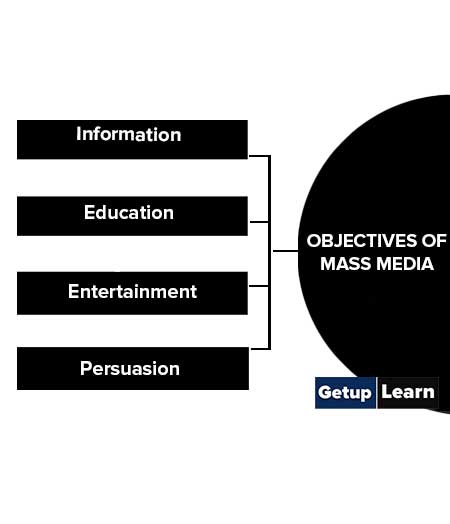
Information
The main objective of mass media is to give information to the people, the target audience. Whether it is a newspaper or magazine or radio or TV or film or social media, the first and foremost objective of a media is to provide the facts, news, and basic information about the events that have occurred. Man is a social animal. It has to live in the company of other people in close proximity.
Information is the only link and even linchpin of society. Hence, the first objective of any mass media is to inform its diversified, heterogeneous, anonymous unstructured, and shapeless audience. It has to keep people abreast with the latest events, news, and tidings in our own region and around the world. As discussed earlier also different mass media have different target audiences.
As a result, they inform different categories of people differently and specifically. In our rural society, the word-of-the-mouth technique is still the most popular and prevalent means of disseminating information. Thus, mass media inform about events and conditions of the society and the world, indicate relations of power, and facilitate innovation, adaption, and progress.
Education
Education is another very important objective of mass media. It is the creation of awareness through the thoughtful interpretation of information. Mass communication, no doubt, provides a brand platform with a lot of opportunities for presenting diverse news, views, reviews, interviews, previews, and solutions, models for several problems, issues, and environmental initiation.
Apart from that, being serious analyzers of such issues and problems day in and day out, the mass media agencies develop certain expertise in such matters. Thus, mass media are designed to educate people by creating awareness about what course of action is to be taken in a movement of extreme crisis.
Entertainment
Another important objective of mass media is to entertain the respective target audiences. Many people are dependent on mass media purely for entertainment. As per the latest report, there is a growth of 38% in the entertainment industry which is unprecedented. Entertainment helps to pass the time easily and to relax comfortably with friends and family members.
Persuasion
Last but not least important. Persuasion is such an objective of communication which brings about change in the human mind, human personality, and human character. It is the ability of the media to convince the target audience of qualitative and quantitative change in a positive direction.
In fact, persuasion is the ultimate objective of any mass media which brings about reformatory change by informing, educating, and entertaining people. Hence, persuasion is that point at which information, education, and entertainment merge together. Therefore, it totally depends on the skills of the communicator to mix information, education, and entertainment in such a proportion that it becomes persuasive.
What are the functions of mass media?
Following are the functions of mass media:
1. Information and Education
2. Socialization
3. Entertainment
4. Political Awareness
5. Cultural Transmission
6. Catalyst to Development.
What are the objectives of mass media?
These are the objectives of mass media:
1. Information
2. Education
3. Entertainment
4. Persuasion.

